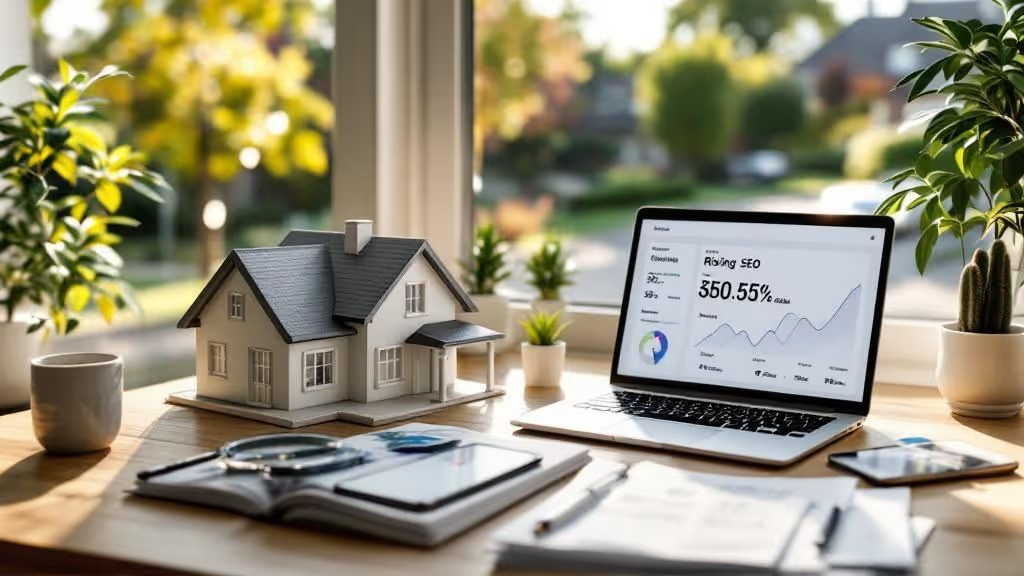A powerful SEO strategy for real estate is no longer a luxury—it's the most effective tool for connecting with serious buyers and sellers precisely when they need you. Think of it this way: SEO places you at the top of the search results when someone types "homes for sale in [your city]" or "how to sell my house fast." Instead of chasing leads, you attract clients who are actively searching for your expertise.
In a competitive market, a great website is just the starting point. You need a strategic plan to become the first name people see on Google, where nearly every property search begins. A sharp SEO strategy for real estate transforms your website from a digital brochure into a lead-generating machine that works for you 24/7.
Why SEO Is Your Most Powerful Listing Tool
SEO isn't just about driving more traffic—it’s about attracting the right traffic. These are individuals already researching neighborhoods, comparing mortgage rates, and seeking a local expert. They are much closer to making a decision than leads from cold calls, which translates to higher-quality opportunities for your business.
The Unmatched ROI of Real Estate SEO
The data speaks for itself. When it comes to financial returns, SEO is a game-changer for the real estate industry. Firms that invest in a focused SEO strategy see an average return on investment (ROI) of around 1,389%—the highest of any sector.
Let's break that down. SEO leads in real estate have a close rate of 14.6%, a stark contrast to the 1.7% close rate for traditional outbound leads like mailers or cold calls. This means SEO drives conversions nearly 8.5 times more effectively than old-school marketing. For a deeper dive into these figures, SearchAtlas.com has a great breakdown of SEO ROI.
The real magic of SEO is that you stop interrupting people with ads. Instead, you become the solution they’re actively searching for. From their very first click, you're positioned as the most helpful, authoritative agent in town.
Foundational Pillars of Success
A successful real estate SEO plan is built on three core pillars. If one is weak, the entire structure is compromised.
- Dominating Local Search: Real estate is inherently local. Appearing in the Google Map Pack and local results for searches like "real estate agent near me" is non-negotiable.
- Creating Authoritative Content: Your website must be a valuable resource. Think detailed neighborhood guides, blog posts about the home-selling process, and answers to common client questions. This builds trust and establishes you as the market expert.
- Technical Website Health: A slow, clunky, or broken website will undermine your rankings. Your site must be fast, mobile-friendly, and structured so search engines can easily understand its content.
Mastering these three elements is the foundation of a winning strategy. To better understand the fundamentals, our guide on why SEO is important for business growth is an excellent resource for turning your website into your best client-acquisition tool.
Dominate Your Local Market with Targeted SEO
For real estate agents, the most valuable leads aren't just browsing online—they're searching in your specific service area. When potential clients need help, they’re not just googling "real estate agent"; they're searching for "realtor in Northwood" or "homes for sale in the Arts District." This is where a sharp local SEO strategy becomes your most powerful tool.
Real estate is a local game. Your success hinges on being the go-to expert for people looking to buy or sell in the communities you serve. Mastering local SEO ensures you are the agent for your target neighborhoods, not just another face online.
Your Google Business Profile Is Your Digital Storefront
Think of your Google Business Profile (GBP) as your digital front door. It’s often the first impression a potential client has, appearing prominently in Google Maps and local search results. A complete profile is essential, but an optimized one is a lead-generation machine.
Start with the basics. Ensure every detail—your name, address, phone number (NAP), and website—is 100% accurate and consistent. Then, be specific with your service areas. List the exact neighborhoods, towns, and zip codes you cover to tell Google precisely where to feature your profile.
Use the "Posts" feature regularly to share new listings, announce open houses, and provide quick market updates. An active profile signals to Google that you're an engaged business. Finally, prioritize reviews. Encouraging and responding to client feedback builds trust and significantly impacts your local ranking.
A well-managed Google Business Profile does more than just list your contact info. It’s a dynamic, interactive billboard that showcases your expertise, highlights your listings, and builds immediate trust with local searchers.
Build Local Authority with Citations and Reviews
Beyond your GBP, build a consistent presence across the web with citations. A citation is any mention of your business's name, address, and phone number (NAP) on other relevant websites, like Yelp, Zillow, and local chamber of commerce directories.
The golden rule is NAP consistency. Every citation must perfectly match the information on your Google Business Profile. Even a small discrepancy, like "St." vs. "Street," can confuse search engines and dilute your local authority. A clean, consistent digital footprint reinforces your connection to a specific area, making you a more trusted result in Google's eyes.
Your online reputation, fueled by reviews, is just as critical. A steady stream of positive reviews on Google, Zillow, and other platforms sends powerful trust signals to both potential clients and search engines. Make it a habit to ask satisfied clients for a review and always respond professionally to all feedback.
Create Hyper-Local Landing Pages
To truly dominate a specific neighborhood, create a dedicated landing page for it on your website. This shouldn't be a generic overview but a comprehensive resource optimized for keywords like "homes for sale in Downtown Austin" or "South Park property listings."
Each page should be the ultimate guide for someone considering a move to that area.
- Current Listings: Embed a live, up-to-date feed of available properties in that specific area.
- Neighborhood Vibe: Describe what it's really like to live there—the community feel, local culture, and resident demographics.
- Local Amenities: Highlight the parks, schools, popular restaurants, and shops that make the neighborhood unique.
- Market Data: Share useful stats like average home prices, recent sales trends, and property value appreciation.
Here’s a quick checklist to keep your local SEO efforts on track.
Essential Local SEO Checklist for Real Estate Agents
This checklist breaks down the core tasks needed to maintain visibility and competitiveness in your local market.
Staying on top of these tasks will give you a significant edge over competitors.
Local SEO is how people actually find homes today. Local and organic searches drive approximately 69% of all digital traffic to real estate services. It's where your clients are. To see what's coming next, you can explore the top SEO insights for real estate in 2025 at immowi.com.
By creating these hyper-local pages, you’re directly answering the questions of serious buyers. For a complete blueprint on optimizing your entire online presence, check out our comprehensive real estate SEO guide to improve your search rankings. This is how you get in front of local clients right when they're ready to make a move.
Create Content That Attracts and Converts Clients
A powerful SEO strategy for real estate is fueled by high-quality content. It drives organic traffic and cements your reputation as the go-to expert in your market. It's time to move beyond generic blog posts and start building a library of resources that genuinely solves problems for buyers and sellers.
The real shift happens when you stop writing about real estate and start acting as a trusted local guide. When your content helps people navigate one of the biggest decisions of their lives, you build unshakable authority and attract clients who want a partner, not just an agent.
Become the Ultimate Neighborhood Expert
One of the most valuable assets you can create is a set of in-depth neighborhood guides. Buyers aren’t just shopping for a house; they’re buying into a lifestyle. Your website should be the definitive source for what it’s really like to live in the communities you serve.
These guides must go deeper than a few paragraphs and stock photos. Put yourself in the shoes of someone relocating to the area. What would they need to know?
- Schools and Education: Detail the local school districts, from public school ratings and special programs to top private school options. This is critical information for families.
- Amenities and Lifestyle: Paint a picture of the neighborhood's character. Highlight the best parks, local-favorite restaurants, coffee shops, and unique attractions.
- Market Data: Provide tangible value with up-to-date stats like average home prices, recent sales figures, and property appreciation trends.
Creating these comprehensive resources helps you attract search traffic for long-tail keywords like "best family neighborhoods in Austin" or "what's it like living in the Pearl District." This is exactly the kind of content homebuyers are actively searching for.
Your content's primary job is to answer the questions your clients are already asking. If you can solve their problems before they even pick up the phone, you’ve already won their trust.
Answer Pressing Client Questions
Beyond neighborhood deep-dives, a winning content strategy tackles the specific anxieties of buyers and sellers head-on. Your blog should become a treasure trove of answers to the most common issues that arise in your daily conversations.
Every question a client asks is a potential blog post that can attract highly qualified organic traffic. This approach showcases your expertise and pre-qualifies leads by demonstrating you understand their needs.
Here are a few topic ideas that always resonate:
- "First-Time Homebuyer Mistakes to Avoid in Dallas"
- "How to Stage Your Home for a Quick Sale on a Budget"
- "Understanding Closing Costs When Buying a Home in California"
- "Should I Sell My Home As-Is or Renovate First?"
Crafting content around these practical pain points helps you rank for question-based searches—a goldmine for capturing people early in their real estate journey. You become the helpful expert who brings clarity to a confusing process.
Leverage Video for Deeper Engagement
While written content is the foundation, video is how you truly connect with your audience. Video is incredibly engaging, and search engines favor it, especially when hosted on platforms like YouTube and embedded on your website.
Incorporate video into your SEO strategy for real estate in a few key ways:
- Immersive Property Tours: A well-shot walkthrough video does what photos can't—it showcases a home's flow and character, giving potential buyers a genuine feel for the space.
- Neighborhood Spotlights: Create short, vibrant videos that capture a community's vibe. Film at a local farmer's market, interview a popular small business owner, or simply walk down the main street.
- Market Update Videos: Record a brief monthly video breaking down the latest market trends. This simple practice positions you as the leading analyst for local real estate data.
By building a complete content ecosystem—combining detailed guides, problem-solving articles, and engaging videos—you give clients multiple ways to find and trust you. This strategy doesn't just pull in organic traffic; it builds an audience that sees you as the undeniable authority in your market.
Getting the Technical SEO Right on Your Real Estate Website
You can have a beautiful website with stunning property photos and brilliant neighborhood guides, but if Google can't easily find, crawl, and understand it, you're invisible. This is where technical SEO comes in. It’s the foundational work that happens behind the scenes to ensure your site is fast, secure, and built in a way that search engines favor.
Don't let the word "technical" intimidate you. Think of it as the plumbing and electrical systems of your digital office. Getting these fundamentals right is a non-negotiable part of any serious SEO strategy for real estate. It’s what separates sites that get consistent traffic from those that don't.
Think Mobile-First, Always
The modern home search happens on a phone. People scroll through listings while in line for coffee or during commercial breaks. If your site performs poorly on a mobile screen, you're not just creating a bad user experience—you're turning away business.
Google now operates on mobile-first indexing, meaning it primarily uses the mobile version of your site to determine its rankings. A clunky, slow-loading mobile experience will torpedo your search visibility.
A great mobile experience requires:
- Responsive Design: Your site should automatically resize to look and work great on any screen, from phone to desktop.
- Thumb-Friendly Navigation: Buttons and links need to be large enough for easy tapping without zooming.
- Quick Load Times: Mobile users are even less patient. Every fraction of a second you can shave off your load time matters.
Speed Is a Feature, Not an Afterthought
Site speed isn't a technical vanity metric; it directly impacts your bottom line. A slow-loading page is a primary reason a potential client will hit the "back" button and go to a competitor's site.
Real estate websites are naturally heavy with high-resolution photos and property videos, making speed optimization a constant priority. Diligently compress images, choose a high-quality hosting provider, and keep your site's code clean. A zippy, responsive website signals professionalism to both users and search engines.
Your website’s speed is a direct reflection of your customer experience. A fast, seamless experience shows potential clients you value their time and attention to detail, building trust before you ever speak to them.
Build a Logical Site Structure
A well-organized website is a win for both users and search engines. It helps visitors find what they’re looking for without frustration and helps search engines understand the hierarchy and importance of your pages. Think of it like a well-planned subdivision—every street is clearly marked and leads logically to the next.
Your homepage should be the main hub, linking to your most important sections like "Homes for Sale," "Selling Your Home," and "Neighborhood Guides." This is also a good place to link to your social media profiles.





